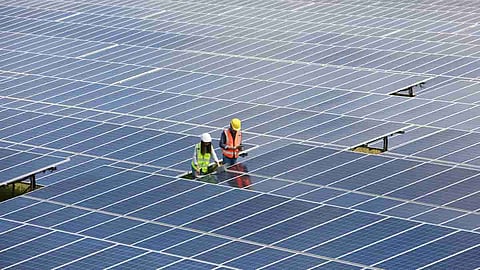

New Delhi: India has achieved a “historic milestone” of 100 GW of solar PV module manufacturing capacity enlisted under the Approved List of Models and Manufacturers (ALMM) for solar PV modules, the Ministry of New and Renewable Energy (MNRE) said in a statement on Wednesday. Announcing the development through a post on X, Minister for New and Renewable Energy Pralhad Joshi said, “India has achieved a historic milestone — 100 GW Solar PV Module Manufacturing Capacity under the Approved List of Models and Manufacturers (ALMM) — a remarkable rise from just 2.3 GW in 2014!”
“Driven by the visionary leadership of Hon’ble PM Shri @narendramodi ji and transformative initiatives like the Production Linked Incentive (PLI) Scheme for High-Efficiency Solar Modules, we are building a robust, self-reliant solar manufacturing ecosystem. This achievement strengthens our path towards #AtmanirbharBharat and the target of 500 GW non-fossil capacity by 2030,” he added.
According to the statement, the country’s solar PV module manufacturing capacity has surged from just 2.3 GW in 2014 to over 100 GW in 2025. The MNRE said the government’s commitment to making India self-reliant in solar PV manufacturing and establishing the country as a major global player is backed by measures such as the PLI Scheme for High Efficiency Solar PV Modules and steps to provide a level playing field for domestic manufacturers. “The catalytic effect of these interventions has resulted in an expansion in solar module manufacturing capacity, from just 2.3 GW in 2014 to over 100 GW today,” the statement noted.
The ALMM Order was issued on January 2, 2019, and the first list for solar PV modules was published on March 10, 2021 with an enlisted capacity of around 8.2 GW. In just over four years, capacity has grown more than twelvefold. The number of enlisted manufacturers has risen from 21 in 2021 to 100 manufacturers operating 123 units across the country.
The MNRE said the growth includes contributions from both established companies and new entrants, many of which have adopted high-efficiency technologies and vertically integrated operations. This has created “a diverse and competitive manufacturing landscape capable of meeting domestic needs and serving global markets.”
Follow Energy Watch on LinkedIN
MNRE added that it remains committed to strengthening the solar manufacturing ecosystem through policy support, infrastructure development, and innovation. “The Ministry will continue engaging with stakeholders to ensure India’s solar journey remains inclusive, competitive, and future-ready,” the statement said.
